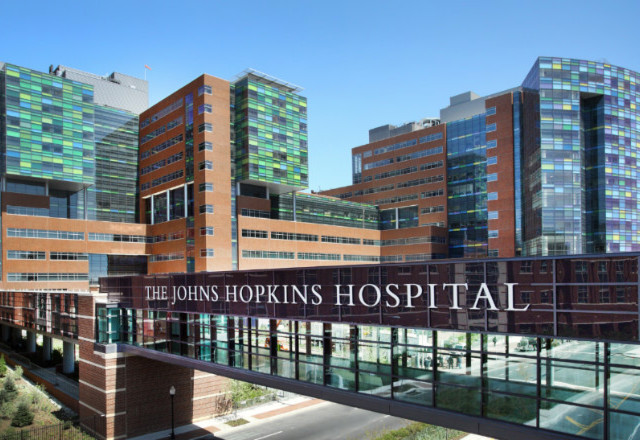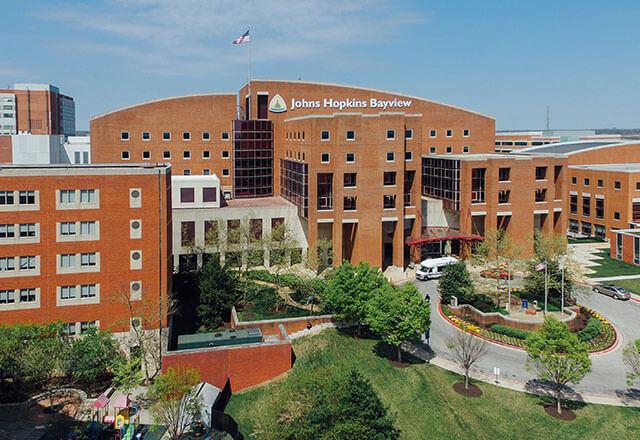For patients who need intensive post-acute rehabilitation to regain function and achieve the highest level of independence before leaving the hospital, Johns Hopkins offers a Comprehensive Inpatient Integrated Rehabilitation Program (CIIRP). The program is staffed by a multi-specialty team of experts and is available in two Baltimore-based inpatient rehabilitation facilities. Our programs provide 7-day-a-week medical and rehabilitation nursing services along with intensive rehabilitation therapy services, 3 hours per day, 5-7 days per week based on your unique treatment needs. Both locations are accredited by the Joint Commission and the Commission on Accreditation of Rehabilitation Facilities (CARF), highlighting our commitment to delivering the highest quality of care.
On this page:
Locations | Why Choose Johns Hopkins | Admission Process | Who Can Benefit from Inpatient Rehab | Patient Outcomes | What to Expect | Accreditations
Our Inpatient Rehabilitation Units
Our acute inpatient rehabilitation units help patients regain skills to perform activities of daily living after they leave the hospital. The home-like setting allows patients the freedom to perform their own care with the guidance of a team of experts.
-
The Johns Hopkins Hospital
Number of beds: 18
Location: Meyer-7
Room type: private
Accreditation: The Joint Commission, CARF-accredited Inpatient Rehabilitation Programs – Hospital (Adult)
-
Johns Hopkins Bayview
Number of beds: 33
Location: Burton Pavilion
Room type: private
Accreditation: The Joint Commission, CARF-accredited Inpatient Rehabilitation Programs – Hospital (Adult) and Stroke Specialty Program (Adults)
Why Choose Inpatient Rehabilitation at Johns Hopkins
Facilities and Technologies
Full Spectrum of Services
World-Renowned Expertise
Admission Process
For Patients
If your care team thinks you might benefit from post-acute rehabilitation, they can send referrals to facilities in the area to check for open spots. You have the freedom to choose your inpatient rehabilitation facility. If you would like to come to Johns Hopkins, let your social worker or case manager know, so that they can send your information to us. Our admissions team reviews all referrals and determines whether a patient meets the admission criteria. If you do, we will offer you a spot at either of our facilities, based on availability as well as specialized care you may need. We will contact your case manager if you have been accepted into the subacute rehabilitation program to initiate the admission process.
For Referring Providers
To initiate the preadmission process, please call one of our inpatient rehabilitation locations. Our team of rehabilitation liaisons can answer any questions about our programs, facilities and the admission process. Our locations coordinate with each other, so if there are no spots available at the facility you contacted, we will automatically check with the other facility.
For The Johns Hopkins Hospital, call 410-502-7156.
For Johns Hopkins Bayview, call 410-550-7642.
Who Can Benefit from Inpatient Rehabilitation
- Neurologic conditions such as stroke, spinal cord injuries, brain injuries, multiple sclerosis flare-ups, brain bleed and brain tumors
- Limb loss
- Orthopaedic conditions such as fractures and joint replacement
- Cardiovascular conditions such as a heart attack
- Burns
- Traumatic injuries
What to Expect
-
Our inpatient rehabilitation team will evaluate patients and will determine if they meet the criteria to be admitted in one of our units:
- 18 years or older
- Have a condition that would improve with rehabilitation, such as a functional impairment
- Medically stable and able to tolerate (physically and cognitively) and actively participate in at least three hours of therapy per day (or 15 hours per week)
- Have a prognosis that indicates reasonable potential to return to a community setting
- Physician intervention required at least three days per week throughout the acute rehabilitation stay for at least one of the following:
- Pain management
- Medication management needed for frequent medication changes
- Cardiopulmonary management
- Complex bowel or bladder management
- Enteral or parenteral feeding for nutritional assistance
- Activities of daily living
- Mobility
- Cognition and communication
- Swallowing
- Patient and family agree to admission to inpatient rehabilitation and the tentative goals and length of stay
-
If you do not already have clothing from home, please ask someone to bring clothing for you – you will need it for your therapy sessions. Wearing your own clothes is more comfortable than wearing a hospital gown during therapy. Bring anything you consider comfortable and practical for exercising and walking, including undergarments and shoes.
We recommend that you also bring the following:
- Dentures
- Hearing aids
- Eyeglasses
- Personal assistive devices you’ve been using, such as wheelchairs, walkers, braces and prostheses
- Toiletries and other personal hygiene items
-
Our inpatient rehabilitation programs offer home-like settings, allowing patients to practice activities of daily living with the guidance of our team of experts. Our inpatient rehabilitation units are staffed with experienced rehabilitation physicians, physical and occupational therapists, speech-language pathologists and recreation therapists. Patients also have access to social workers, rehabilitation nurses, psychologists, dieticians, orthotists who work together to deliver the best possible care based on your needs.
Learn more about the different roles within the care team.
-
Our team works with each patient to create a care plan that identifies the patient’s abilities and needs and ensures the patient’s goals and concerns are addressed. See example of what can be included in a care plan (.pdf)
We encourage family and friends to be involved in the patient’s care. Our nurses and therapists ensure that patients and caregivers understand and are comfortable with their roles before leaving the hospital.
-
Your schedule may change from day to day; it is posted in your room the night before. When you are not in therapy, specially trained nursing staff are available to assist you in practicing the skills you have learned during therapy sessions while in your hospital room.
Morning
Your nursing team will give you medications and help you prepare for morning activities. Your nursing assistant or therapist will assist with activities of daily living (ADLs), such as bathing, dressing and grooming. If a therapist is helping you, these ADLs will be performed during your morning therapy sessions.
Afternoon
Break for rest and lunch. If needed, therapists may work with you during lunch on swallowing and self- feeding skills. After the lunch break, therapy sessions resume and continue until dinner.
Evening
Dinner and visits with your family and friends conclude your day. We encourage family members to observe and participate in therapist sessions throughout your stay.
-
You and your caregiver will participate in discharge planning with your rehabilitation team. Most patients we see go home after inpatient rehabilitation. However, some patients need additional help in their recovery and may be discharged to a long-term care or a subacute care facility. If a patient’s condition worsens or a new one develops during inpatient rehabilitation, they may need to be admitted to an acute care unit and may need to repeat inpatient rehabilitation once they are better again.
During this transition out of inpatient rehabilitation, our care management team will help you with:
- Identifying where you will live after discharge and what level of care you will need
- Obtaining the necessary equipment and medications
- Planning medical appointments
- Educating you and your caregivers on what to expect after leaving the hospital
- Providing a list of resources, such as support groups
Our care management team will be available to answer questions after you are discharged.
Johns Hopkins offers a continuum of care beyond inpatient rehabilitation through home care and outpatient care in different locations throughout the region and provides ongoing support for your recovery process and community reintegration.
July 1, 2022 - June 31, 2023 Patient Outcomes
Average Length of Stay
Johns Hopkins Bayview: 13.3 days
Patient Discharge Location
Johns Hopkins Bayview: 80.4% return to community or home upon discharge
Overall Patient Satisfaction (out of 4)
Johns Hopkins Bayview: 3.81
National Benchmark Performance: 3.70




